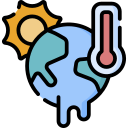Temperature extremes

Rising temperatures have been threatening our health for decades, but in particular areas at high latitudes, such as North America and Europe, the threat is more pressing as heat extremes occur more frequently. Climate and demographic trends suggest that heat waves will be more persistent. Already today, mortality rates caused by abnormal heat waves have increased alarmingly and forecasts for the next 40 years indicate that mega heat waves will increase in frequency from 5 to 10 times.
Heat stress, kidney problems (caused by severe dehydration), cardiovascular, mental and respiratory diseases are sadly increasing hospital statistics in the most populated cities and towns. Certainly the increased use of refrigeration systems such as air conditioners has reduced the risk of death, but today it is the more accurate warning programmes (weather forecasts) that actually help to avoid the greatest dangers and damage.
The most vulnerable to health problems caused by rising temperatures are the elderly and those living in social isolation or severe poverty. People suffering from mental illnesses are also affected: depression, for example, can intensify in hot weather, and dementia can also worsen during high heat waves, posing the highest risk of hospitalisation and death.
A final consideration: with the warmer climate winters have become milder and this has led to a reduction in illnesses and deaths associated with the cold but, nevertheless, these reductions are not considered to be compensated by the increase in deaths due to heat because the balance of these two opposing values may depend on numerous factors including geographical location, the composition and structure of the population living there (the elderly, children, the sick, poverty, etc.).








